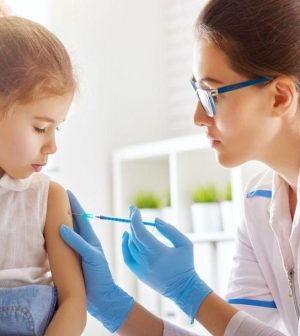- Recognizing the Signs of Hypothyroidism
- 10 Strategies to Overcome Insomnia
- Could Artificial Sweeteners Be Aging the Brain Faster?
- Techniques for Soothing Your Nervous System
- Does the Water in Your House Smell Funny? Here’s Why
- Can a Daily Dose of Apple Cider Vinegar Actually Aid Weight Loss?
- 6 Health Beverages That Can Actually Spike Your Blood Sugar
- Treatment Options for Social Anxiety Disorder
- Understanding the Connection Between Anxiety and Depression
- How Daily Prunes Can Influence Cholesterol and Inflammation
Survey Finds U.S. Parents Split on COVID Vaccination for Kids Under 12

As a new school year approaches, U.S. parents are nearly evenly split on whether they’ll vaccinate their young kids when a COVID-19 vaccine is approved for their age group, a new survey finds.
“It’s important that parents and providers don’t wait for full COVID vaccine approval to begin discussions about vaccination,” said Sarah Clark, co-director of the C.S. Mott Children’s Hospital National Poll on Children’s Health, at Michigan Medicine, University of Michigan.
COVID-19 vaccines are authorized for Americans 12 years and older, and clinical trials are underway for their use in kids under 12.
In this June survey of more than 2,000 parents with at least one child between 3 and 18 years of age, 49% parents with kids aged 3 to 11 said they would likely get their child vaccinated, while 51% said they were unlikely to do so.
Among parents of 12- to 18-year-olds, 39% said their child had already received the shot, 21% said their child would likely get it and 40% said they were unlikely to do so.
Thirty-eight percent of parents with low incomes said their child is likely to get the shot, compared to 60% of those with higher incomes, the poll found.
Many parents said the recommendation of their child’s health care provider will be influential in their decision. But 70% of those with 3- to 11-year-olds and half of those with 12- to 18-year-olds said they hadn’t discussed the COVID-19 vaccine with their child’s doctor.
Aside from the advice of their child’s health care providers, other factors parents of unvaccinated children said would be important in their decision include: vaccine side effects (70%); testing in the child’s age group (63%); how well the vaccine works in kids (62%); and their own research (56%).
More parents of older than younger children (41% versus 19%) said their regular health provider recommends COVID-19 vaccination.
Only 19% of parents whose child got vaccinated said it was done in a doctor’s office. Twenty-nine percent got the shot at a public COVID-19 vaccination site and 36% at a retail pharmacy.
But more parents of unvaccinated children said their preference was to get their child vaccinated at a doctor’s office (42%), compared to 5% who would choose a pharmacy or public site, and 19% who had no preference.
“As children prepare to return to school, our poll provides insight into parents’ current stance on vaccinating kids and what factors into their decision making,” Clark said in a university news release.
She suggested that parents of younger children who have appointments for check-ups or minor illnesses should include questions about the COVID-19 vaccine during those visits.
“Our poll suggests parents are already forming opinions, and it’s essential that their decision-making process include accurate information, as well as a professional recommendation from the child’s health care provider,” she said.
More information
The American Academy of Pediatrics has more on COVID-19 vaccines.
SOURCE: University of Michigan, news release, July 26, 2021
Source: HealthDay
Copyright © 2026 HealthDay. All rights reserved.










